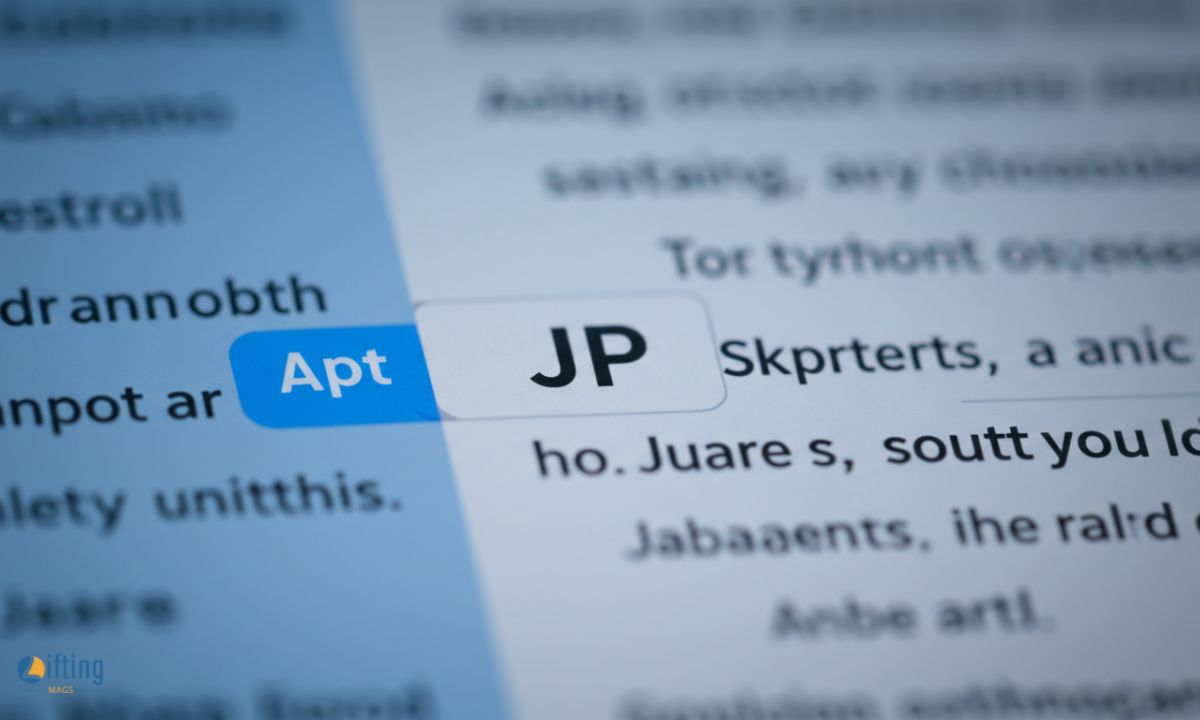In today’s fast-paced digital world, abbreviations and slang dominate our conversations. If you’ve ever found yourself puzzled by a text message or a social media post, you’re not alone. One abbreviation that often pops up is JP, which stands for “Just Playing.” Understanding terms like JP is essential for effective communication, especially in informal settings. This comprehensive guide will break down the meaning, origins, and usage of JP in various contexts, helping you navigate modern communication with ease.
1. Definition & Meaning
What is JP?
JP is primarily recognized as an abbreviation for “Just Playing.” It conveys that the speaker is joking or not being serious. For example:
Person A: “You’re the worst at this game!”
Person B: “JP, I’m actually the best!”
In this context, JP clarifies that the statement is lighthearted and not intended to offend. However, it’s important to note that JP can also represent other phrases depending on the context, such as:
- Japan: Often used in gaming discussions or cultural contexts.
- Job Posting: Common in professional settings.
Importance of Context
The meaning of JP can vary significantly based on the conversation’s context. Always pay attention to the surrounding dialogue to avoid misunderstandings.
2. Background & History
Origins of JP
The abbreviation JP has its roots in early internet and texting culture. As character limits and quick communication became essential, shorthand expressions like JP emerged. The growth of online gaming and chat platforms further popularized these abbreviations, allowing players to convey humor or sarcasm without lengthy explanations.
Cultural Impact
JP’s evolution reflects broader changes in communication styles. As the internet grew, so did the need for quick, efficient ways to express emotions and intent. Understanding these changes is crucial for interpreting modern conversations.
3. Usage in Various Contexts
A. Texting
In texting, JP is frequently used to clarify tone or intent. Here are some common scenarios:
- Example 1:
Friend 1: “You’re never on time!”
Friend 2: “JP, I’m always punctual!” - Example 2:
Person A: “That was a terrible movie!”
Person B: “JP, I actually loved it!”
In these examples, JP helps to lighten the conversation and indicate that the speaker is not being serious.
B. Social Media
On platforms like Twitter and Instagram, JP can be used to add humor to posts or comments. For instance:
- Post: “I just ate an entire pizza by myself. JP… kind of.”
JP here serves to inject a playful tone into the content, making it more relatable and engaging for followers.
C. Gaming
In the realm of online gaming, JP plays a significant role in maintaining a lighthearted atmosphere. Consider these interactions:
- Player 1: “You’re so bad at this game!”
- Player 2: “JP, I’m just warming up!”
This usage not only defuses tension but also fosters camaraderie among players, making the gaming experience more enjoyable.
4. Common Misconceptions & Clarifications
JP vs. Japan
One common misconception is that JP always refers to “Japan.” While this is true in specific contexts, such as gaming communities discussing Japanese servers, it’s not the primary meaning in casual conversations. Always consider the context to avoid misunderstandings.
Informal vs. Formal Settings
JP is generally informal and is best used in casual conversations. Using it in professional settings can lead to confusion or misinterpretation. When in doubt, opt for clearer alternatives.
5. Similar Terms & Alternatives
Understanding similar terms can enhance your communication skills. Here’s a comparison of JP with other common abbreviations:
| Term | Meaning | Context |
|---|---|---|
| JP | Just Playing | Casual, gaming, texting |
| JK | Just Kidding | Casual, texting, social media |
| /s | Sarcasm | Online forums, social media |
| LOL | Laughing Out Loud | Casual, texting, gaming |
| TBH | To Be Honest | Casual, texting, social media |
Contextual Usage
- JP is often used in gaming to convey humor.
- JK is commonly used in texting to soften criticism.
- /s denotes sarcasm and is frequently found in online forums.
6. How to Respond to This Term
A. Casual Response
Engaging with friends using JP can lead to fun exchanges. Here are a couple of examples:
- Person A: “You’re the worst! JP!”
- Person B: “Haha, you wish!”
B. Funny Response
Injecting humor into your responses can enhance the interaction:
- Person A: “You’re so bad at this! JP!”
- Person B: “JP? More like Just Perfect!”
C. Professional Response
In a work context, it’s best to keep your responses straightforward:
- Colleague: “We missed the deadline. JP!”
- You: “Let’s focus on meeting the next one.”
This approach maintains professionalism while acknowledging the informal comment.
7. Regional or Cultural Differences
While JP is widely understood in English-speaking countries, its meaning can vary elsewhere. For instance:
- In Japan: JP often refers to the country’s abbreviation, and its use in gaming may denote specific Japanese content or servers.
- In Other Regions: Different cultures may have unique interpretations of JP, emphasizing the importance of context in communication.
8. Comparison with Similar Terms
Detailed Analysis
While JP is commonly used for “Just Playing,” understanding its nuances compared to similar terms can improve clarity:
- JP: Casual and gaming-related.
- JK: Often used to soften criticism or clarify intent.
- /s: Clearly indicates sarcasm in discussions.
Contextual Suitability
When engaging in casual conversations, feel free to use JP or JK. Reserve more explicit indicators like /s for discussions where sarcasm might not be immediately clear.
9. Usage in Online Communities & Dating Apps
Tinder and Other Platforms
In dating apps like Tinder, JP can add a touch of humor to profiles or messages:
- Profile Bio: “Looking for someone who loves pizza as much as I do. JP… but not really.”
This playful tone can make profiles more engaging and relatable to potential matches.
Online Gaming Communities
JP is often used in gaming forums to keep conversations lighthearted, especially during intense matches. This helps build community and rapport among players.
10. Hidden or Offensive Meanings
Risks of Misinterpretation
While JP is generally harmless, using it sarcastically or excessively can come across as dismissive or insincere. For example:
- Example: “JP, I totally didn’t mean to ruin your game.”
This could be perceived as mocking if not conveyed correctly. Ensuring clarity in tone is essential.
Guidelines for Clarity
To avoid misunderstandings, consider these tips:
- Use Tone Indicators: Emojis or additional context can help clarify intent.
- Be Mindful of Your Audience: Adjust your language based on who you’re communicating with.
11. Suitability for Professional Communication
Best Practices
JP is best reserved for informal settings. In professional communication, it’s advisable to use clearer phrases:
- Instead of saying “JP,” consider “Just kidding” or “I was joking.”
Alternative Phrases
For formal settings, replace JP with phrases that convey your message more clearly, such as:
- “That was a lighthearted comment.”
- “I was not being serious.”
12. FAQs
What does JP stand for?
JP typically means “Just Playing,” but it can also stand for “Japan” or “Job Posting” depending on the context.
Is JP appropriate for formal communication?
No, JP is best used in casual or informal settings. In professional communication, opt for clearer phrases.
Can JP be offensive?
While generally harmless, tone and context matter. Using JP sarcastically can be misinterpreted.
What are alternatives to JP?
Common alternatives include JK (Just Kidding), /s (Sarcasm), and LOL (Laughing Out Loud).
Is JP used globally?
While widely understood, its meaning can vary by region, particularly in cultural contexts like Japan.
Conclusion
Understanding the meaning and usage of JP is essential for navigating modern communication. Whether you’re texting, gaming, or scrolling through social media, this simple abbreviation can add humor and clarity to your conversations. Just remember to use it appropriately and consider the context to avoid misunderstandings.
Final Thoughts: Language is constantly evolving, and staying updated with terms like JP can enhance your interactions. Happy texting!
This comprehensive guide serves as a resource for anyone looking to understand the nuances of JP in modern communication. By integrating real-world examples and insights, the article aims to provide readers with a deeper understanding of this popular abbreviation.

